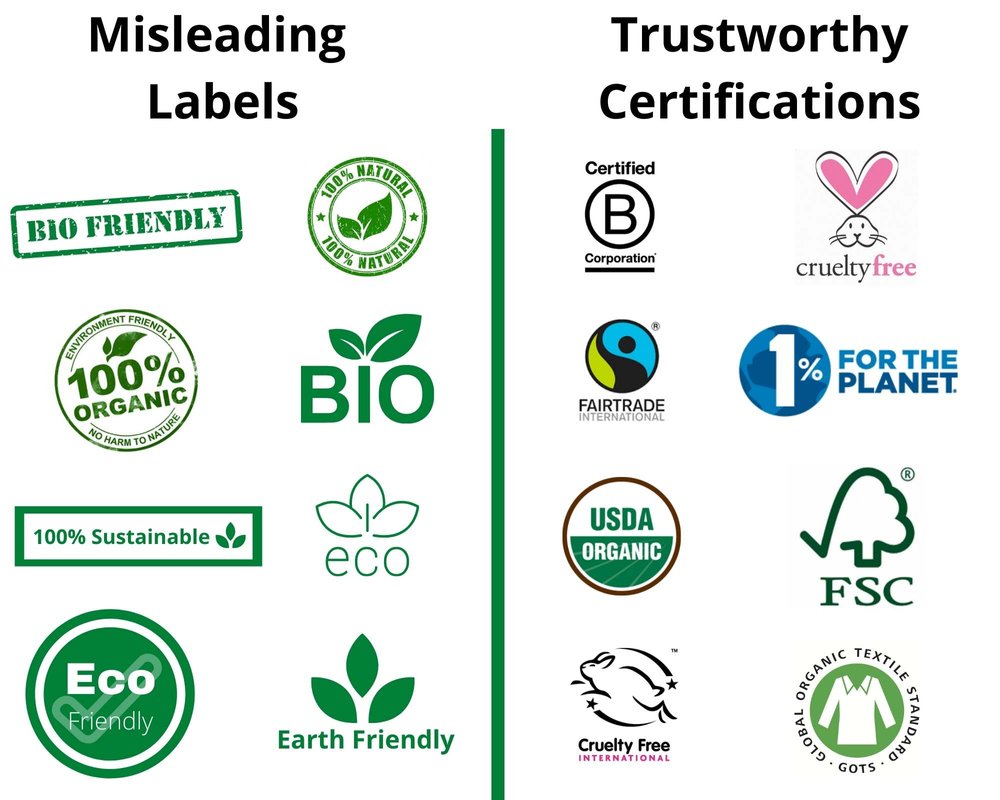In today’s world, where environmental consciousness is on the rise, consumers are increasingly drawn to products that promise sustainability and eco-friendliness. However, not all products that claim to be green are as environmentally friendly as they seem. This deceptive practice known as greenwashing, can mislead well-intentioned buyers into supporting companies that aren’t truly environmentally friendly. Here’s what you need to know about greenwashing and how to spot it.
What is Greenwashing?
Greenwashing is a marketing tactic used by some companies to falsely present their products or services as environmentally friendly. often with little to no evidence to support such claims. It’s a play on the term “whitewashing,” implying that a company is covering up its less sustainable practices with a thin veneer of green. This can involve misleading labels, overstated claims, or emphasizing a small green aspect to distract from larger environmental harms.
Examples of Greenwashing
- A car manufacturer claims its vehicles are “clean diesel” when they actually exceed legal emissions limits.
- A food brand claims their nutrition bar is made from “natural” or “organic” sources without any certification or other evidence to support.
- A clothing brand promotes a line of “eco-friendly” garments while the majority of their production is unsustainable.
- A company uses green imagery and buzzwords like “natural” or “green” on products that are not significantly better for the environment.

How to Spot Greenwashing
Greenwashing not only misleads consumers but also undermines genuine efforts towards sustainability. To combat this deceptive practice, it’s crucial for consumers to be able to identify greenwashing and make informed choices. Here are some tips to help you spot greenwashing and choose truly sustainable products:
- Vague Claims: Be wary of broad statements like “green” or “eco-friendly” without specific details or certifications to back them up.
- Lack of Proof: Trustworthy companies will provide evidence of their environmental claims, such as third-party certifications or detailed information about their sustainability efforts.
- Irrelevant Claims: Some products may boast about an eco-friendly feature that is standard and not unique to the product.
- Lesser of Two Evils: A product might be slightly less harmful than alternatives but still have a significant negative environmental impact.
- Hidden Trade-Offs: A product’s green claim might be true within a narrow scope but ignores other significant environmental issues.
Tips for Avoiding Greenwashing
- Look Beyond the Packaging: Don’t be swayed by flashy labels or claims of being “natural” or “green.” Dive deeper into the product’s ingredients, manufacturing processes, and overall environmental impact.
- Check for Certifications: Genuine eco-friendly products often carry third-party certifications from organizations like the Forest Stewardship Council (FSC), Fair Trade Certified, or USDA Organic. These certifications validate a product’s environmental claims and ensure transparency.
- Research the Company: Look into the company’s track record and environmental initiatives. Are they transparent about their sustainability efforts? Do they publish reports detailing their environmental impact and goals? Companies committed to sustainability will usually be forthcoming with this information.
- Scrutinize Specific Claims: Be wary of vague or unverifiable claims such as “eco-friendly” or “100% natural.” Look for specific details about how the product is environmentally friendly, such as reduced carbon emissions, use of renewable materials, or water conservation efforts.
- Consider the Entire Lifecycle: A truly sustainable product considers its environmental impact from production to disposal. Look for products with minimal packaging, recyclable or biodegradable materials, and a commitment to reducing waste throughout the entire lifecycle.
- Read Reviews and Do Your Homework: Take the time to read reviews and testimonials from other consumers who have used the product. They can provide valuable insights into the product’s actual performance and environmental claims.
- Be Skeptical of Greenwashing Trends: Keep an eye out for trends or buzzwords that seem to be exploited for marketing purposes. For example, the term “green” itself has become so overused that it’s often misinterpreted or diluted in meaning.
As consumers, we have the power to drive real environmental progress by being informed and making conscious choices. By learning to spot greenwashing, we can ensure our purchases align with our values and support truly sustainable practices.
Remember, genuine green companies will be transparent, provide proof, and focus on comprehensive environmental responsibility. Let’s be vigilant and encourage a market where green means truly green.
Government Steps to Combating Greenwashing
Greenwashing is a “buzzword” that is hot amongst the environmental sustainability communities, however governments word wide are taking notice and are now starting to step up their efforts to combat this deceptive practice.
United Nations: Zero Tolerance for Net-Zero Greenwashing
At the international level, the United Nations has called for zero tolerance towards net-zero greenwashing. A UN expert panel outlined five key recommendations to ensure that environmental pledges are honest and contribute meaningfully to the fight against climate change. These recommendations include making public net-zero pledges with specific targets and calling for regulation to ensure these pledges are genuine.
EU Parliament passes the Empowering Consumers for the Green Transition (ECGT) Law
The law introduced late in 2023, bans the use of greenwashing tactics including climate neutral claims, and generic eco terms such as “eco,” “biodegradable,” “environmentally friendly,” “natural” and “climate neutral” will all be restricted without evidence to support the claim. Companies will only be allowed to mark a product as “eco” or “green” when the entire product is truly greener than conventional ones, and certified by a trustworthy scheme such as the EU Ecolabel. Companies will no longer be allowed to market any product as green, sustainable, or eco-friendly if only a minor aspect of the product or business has been made more sustainable.
United States: FTC’s Green Guides Revision
The United States which has been historically slow to adapt new guidelines or laws that benefit the consumer or the environment at the expense of big business; however, the Federal Trade Commission (FTC) issued an update in 2012 to revise portions of its “Green Guides“. This is the first time in over a decade the FTC made any updates to these guides. The “Green Guides” provides businesses with principles and examples to help avoid making deceptive environmental claims. While the guides are advisory, they form the basis for enforcement actions against companies that violate federal law. It’s a good step forward to reduce the use of Greenwashing tactics but stricter policies with more enforcement and higher penalties are needed before large U.S. based companies feel the pressure to change their business model to more sustainable products and market these said products correctly.
Global Regulatory Actions
Governments around the world are recognizing the need for stricter regulations to prevent greenwashing. In the UK, the Competition and Markets Authority (CMA) is investigating major fashion brands over vague green claims. Similarly, the Australian Competition & Consumer Commission (ACCC) lists sustainability communication among its key priorities. In Italy, an oil company was fined €5 million for falsely advertising its diesel as “green”. In the US, the FTC sued Kohl’s, Inc. and Walmart, Inc. for falsely marketing dozens of rayon textile products as bamboo. Both companies marketed that the textile products were made using eco-friendly process; however, when you convert bamboo into rayon it requires the use of toxic chemicals and results in hazardous pollutants. The court has ordered the companies to pay penalties of $2.5 million and $3 million.
The Way Forward
As greenwashing becomes a growing concern, it is clear that government intervention is crucial to maintain the integrity of environmental claims. By implementing stricter regulations and guidelines, governments can ensure that companies are held accountable for their marketing practices. This not only protects consumers from being misled but also supports the broader goal of achieving genuine sustainability.
In conclusion, the fight against greenwashing is gaining momentum, with governments playing a pivotal role in ensuring that environmental marketing is transparent and truthful. As these efforts continue to evolve, it is hoped that they will lead to a more sustainable future, where environmental claims are not just marketing tactics but reflections of real commitment to sustainability.
For more detailed information and the latest updates on these initiatives, please refer to the sources cited throughout the article.
- What Is Greenwashing? (nrdc.org)
- What is greenwashing—and how do you avoid it? (nationalgeographic.com)
- A spotter’s guide to greenwashing – and what to do about it | World Economic Forum (weforum.org)
- What is greenwashing and how can you spot it? – BBC Newsround
- Learn to Spot Greenwashing (nrdc.org)
- PolitiFact | Red light on ‘greenwashing’? US regulatory agency takes fresh look at deceptive climate claims
- https://www.europarl.europa.eu/meetdocs/2014_2019/plmrep/COMMITTEES/IMCO/AG/2023/11-28/1289669EN.pdf
- https://oeil.secure.europarl.europa.eu/oeil/popups/ficheprocedure.do?reference=2023/0085(COD)&l=en
- https://eeb.org/new-eu-law-empowers-consumers-against-corporate-greenwashing/
- https://www.ftc.gov/news-events/topics/truth-advertising/green-guides
- https://www.ftc.gov/news-events/news/press-releases/2012/10/ftc-issues-revised-green-guides
- https://nortonrosefulbright.com/en-us/knowledge/publications/e87c69e7/greenwashing-disputes-on-the-rise




I love how this blog gives a voice to important social and political issues It’s important to use your platform for good, and you do that flawlessly
I appreciate the clarity and thoughtfulness you bring to this topic.